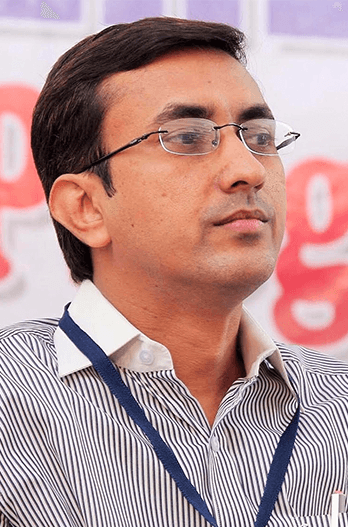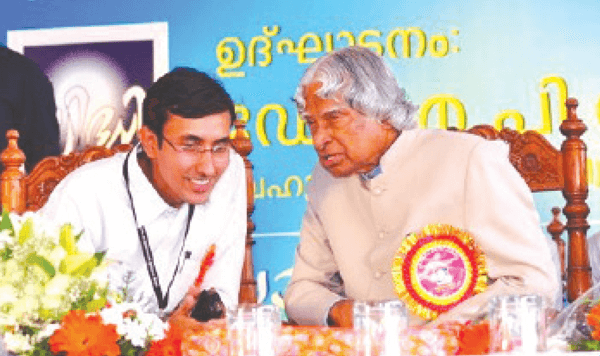
Prof. M Abdul Rahiman
Prof. M Abdul Rahiman, an eminent academician and an able administrator, currently is the Director of LBS Centre for Science (LBSCST) & Technology and Principal of LBS Institute of Technology for Women (LBSITW). He served as first Pro Vice chancellor of APJ Abdul Kalam Technological University, Kerala.
He received the Doctor of Philosophy (Ph.D.) degree in Computer Science & Engineering from Karpagam Deemed to be University. He obtained his Master of Technology from Kerala University in 2004, and Bachelor of Technology from Calicut University 1998. He achieved Post Graduate Diploma in Human Resource Management from Kerala University in 2006 & Master of Business Administration (MBA) in 2008.He was the former Director, All India Council for Technical Education (AICTE), the apex body of technical education under Ministry of Human Resource Development, Government of India which regulates Engineering, Management, Architecture, Hotel Management, Pharmacy institutions of the country.He also served as Director, VHSE, Govt. of Kerala
Having joined in University as the founder PVC, he has been at the forefront of bringing in some radical changes in the Academics, Examination and Administration of the APJ Abdul Kalam Technological University (KTU). He brought transparency and accountability in its administration through e-Governance. Some of the challenges he succeeded are as follows.
Some of the challenges he succeeded are as follows.
- KTU is formulated to unify the technical education system in the State and cater the needs of the technical community. All the technical institutions throughout the state is under the umbrella of the university. A sophisticated and transparent system is in place for administration, affiliation and academics. E-Governance is suggested in all possible units of the University.
- KTU has initiated major changes in the academic regulations and curriculum for the Engineering education. On meeting specific conditions, a student can get a B.Tech (Honours) Degree, an innovative concept with respect to technical education in the state.
- In addition to academics, students have to actively engage in co-curricular and extra-curricular activities. Points are allotted for such activities. There is a defined Academic calendar for curricular, co-curricular and extra-curricular activities and vacation for doing internship.
- In order to encourage the entrepreneurship activities, KTU has introduced B.Tech Minor Degree in Entrepreneurship which is a novel concept in the state.
- Credit transfer facility from other University/Academic Institution is also supported by KTU which is new in Kerala. The Academic Community and other Universities in the country is keenly watching the effect of technical shift in the engineering curriculum brought into effect by KTU. The outcome based education imparted by KTU is student centred having freedom to opt the courses he like. The aim of KTU is to bring about a stupendous transformation instead of incremental changes to leverage the possibilities of technology and the skills of the current generation of youth to take our nation forward.
- KTU has introduced academic auditing of Engineering Courses to ensure the quality and mould the institute to equip them to outcome based education.

- KTU has come up with novel concept in financial management with respect to cash disbursement and receipts. The University has adopted corporate banking system which uncommon in Govt offices. There is no Account book, No cashier or Accountant. Everything is dealt by an Assistant with the use of online banking system.
- In order emerge Kerala as the No.1 Destination in India for Startups and amongst the top 5 startup ecosystems in the world, Kerala Technological University has come up with a start up policy for its stake holders. Start up policy published by the KTU in tune with the State Govt policy on start ups.
- KTU has introduced ‘open book examination’ system for the engineering undergraduate course, which will allow candidates to refer study material during the examination.
- KTU’s startup policy aims at generating 10000 student startup ideas every year. KTU’s Policy aims to achieve the following by year 2020; Encourage/Facilitate/ Incubate at least 1000 technology product startups. Out of these, the policy aims to help convert 1000 start-ups into proof of concept and eventually, lead 100 of these student startups into successful and scalable enterprises. The policy aims at encouraging enterprises, which serve social and economic needs. The incubation policy will cover incubation amenities for all students, Staff and alumni, irrespective of their streams.
- KTU has introduced cluster autonomy for the conduct of the M.Tech programme, which is a novel scheme and will be a first step towards granting autonomy to individual institutions.
- Published the results within a week after the examination.
- University has inculcated best practices on entrepreneurship development of students and faculty members and created entrepreneurial culture. FABLAB system of MIT, US is installed at Engg Colleges and MoU with MIT for Minor in Entrepreneurship.

Having joined in AICTE in February 2012 as its Director, he succeeded in bringing many initiatives in the AICTE through e-Governance. He has implemented the DBT (Direct Beneficiary Transfer) program.
He was in charge of e-Governance at AICTE. The e-Governance development at AICTE is a complete web enabled application, where the entire process of receiving the applications to processing the same until an approval is given is on-line. This has greatly improved the transparency and accountability. The Portal also provides complete information along with video of more than 11500 institutions in the public domain. The Business intelligence reports generated provides for comprehensive statistics on technical education in the country. The development using Oracle-Siebel CRM is extremely robust and scalable providing for several features that aid the student and the teacher community.
Prof. Abdul Rahiman is also associated with National Vocational Education Qualification frame work which would help in promoting skill based competency modules to be integrated into eight certification levels where a student can undergo skill based learning that enhances employability and employment opportunities and also allowing him/her the flexibility to pursue formal education or take up an appropriate job at the end of any level of certification.
He headed the Internal Audit Department of AICTE, which provides the right path for spending the government funds. Under his leadership, Internal Audit Cell developed a Audit Manual first time in the history of AICTE.
He also associated with Prime Minister’s Scholarship Scheme for the State of Jammu & Kashmir with the aim to encourage the youth of J&K to pursue higher studies throughout the country and mingle different cultures and thus bringing them to the integral part of the Country.
Dr Abdul Rahiman is instrumental in bringing AICTE office to Kerala. Moreover, DBT (Direct Benefit Transfer) Scheme is introduced in AICTE for disbursement of Scholarships with the active participation of Rahman. This was appreciated by the Ministry
While serving at LBS Institute of Technology for Women, Trivandrum, he was appointed as Director Vocational Higher Secondary Education to the Government of Kerala. Vocational Education is designed to prepare skilled work force in middle level in one or more group of occupations trade or job after matriculation at 10+2 stage of Education. The objective of the course is to enhance individual employability and to provide an alternative for those pursuing higher education. It is a distinct stream intended to prepare students for identified occupations. There are 375 VHSE Schools under the Directorate. The administration and control of the entire institution and staff are vested with the Director.
He has initiated many changes for Vocational Education including the syllabus revision and has initiated skill development campaign in schools which is the need of the nation which was inaugurated by Dr APJ Abdul Kalam.
He specializes in Digital Image Processing & Pattern Recognition and he taught for more than 10 years having a rich teaching experience and guiding many PhD scholars in the area of DIP, Data Mining and Networking. He has many international publications into his credit. Serving as Member of many professional & technical bodies, he has chaired many Technical Conferences. Also serving in the Editorial board of many International Journals. He was instrumental in bringing the TEQIP Project to his parent institute LBSITW Trivandrum with a financial assistance of 10 Crores.
Prof Abdul Rahiman was a Member of National Testing Scheme, a committee constituted by Ministry of HRD to devise National Testing Scheme. Students emerging from secondary school and seeking admission to professional programs in higher education are required to appear in a multitude of entrance examinations. Ministry of Human Resource Development needs that the multiplicity of examinations needs to be dispensed with and develop a nationally accepted testing mechanism. The idea of developing a national testing scheme with the oversight of a National Testing Authority has been under consideration of the Ministry of HRD for some time. IITs, NITs,Institutions of National Importance, IIMs, and Central Medical Institutes are conducting their own entrance examinations which are diverse in nature and causes disturbance to students. This committee has been constituted to suggest guidelines for a common test and constitution of National Testing Authority to implement this mechanism.
He was also a Member of Advisory body of Technical Education UT of Daman Diu, which guides the Technical & Higher Education area.
He has authored and edited few books published by reputed international publishers and published papers in academic journals and international and national proceedings. Rahman has served as Guest Editor for special issues in few international journals and program committee member for many international conferences and workshops. He has co-chaired several international workshops and conferences.
While delivering his speech in the inauguration of Siddhi 2020, a skill development program of VHSE Kerala, Dr APJ Abdul Kalam mentioned “Abdul Rahiman is the most energetic and dynamic Director of VHSE”. Dr Rahman treats this as the best award, he has achieved in his life. (Please visit http://www.youtube.com/ watch?v=Zikgb8l1i-0).
